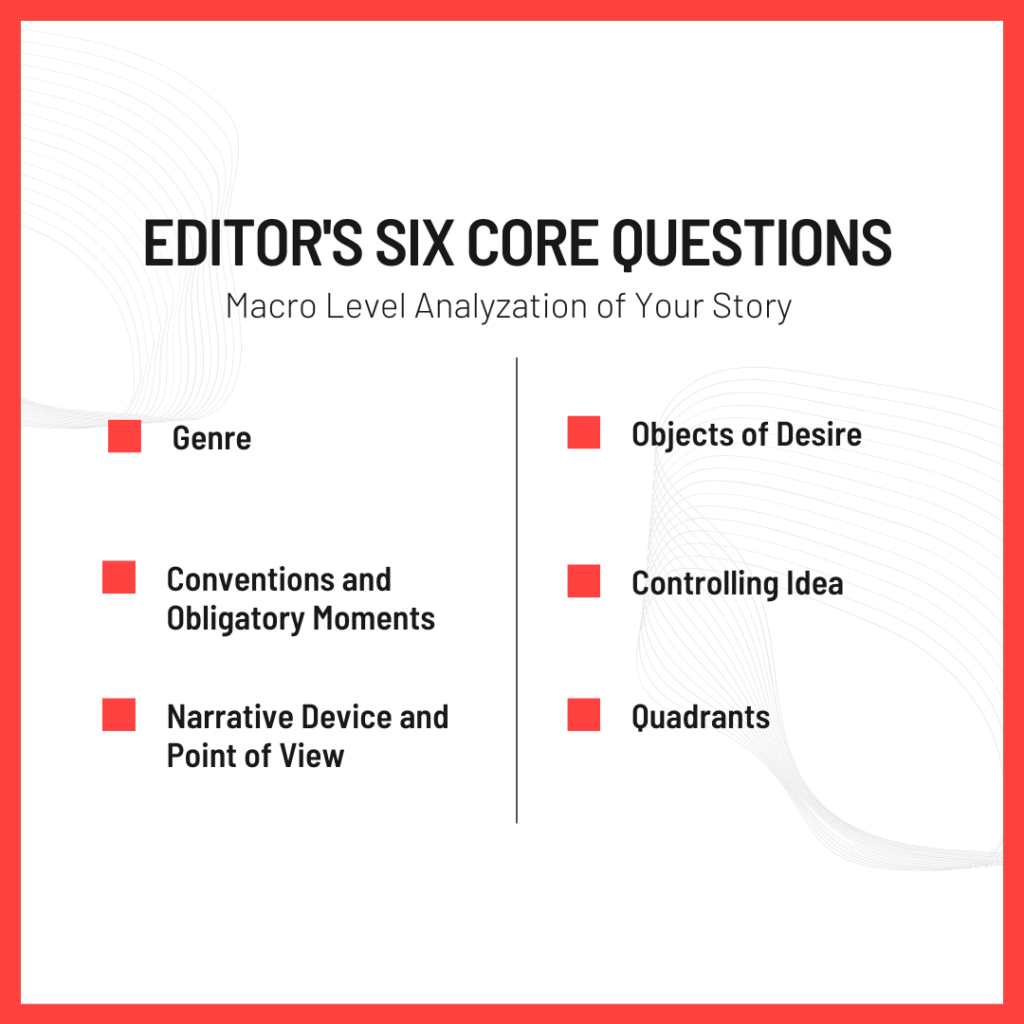What are the Editor’s Six Core Questions?
The Editor’s Six Core Questions are a series of inquiries we use to diagnose a manuscript. By testing our stories this way, we can assess where we’ve gotten off track and identify specific and actionable steps to make the story better. We can also use these questions to analyze MASTERWORKS to understand what makes a great story work.
We use the Editor’s Six Core Questions to create our GLOBAL FOOLSCAP, which enables us to view all the global elements of our story on a single page for quick and easy reference.

1. What is the Genre?
GENRE is a label that tells audience members what to expect from our stories. It is a clear framework to catalog all stories and helps writers give audience members what they are hoping for—and more.
Genre is divided into five parts: CONTENT, TIME, STYLE, REALITY, and STRUCTURE. These are the parts of the FIVE LEAF GENRE CLOVER. By defining the story this way, we can meet reader expectations in innovative ways.
2. What are the Conventions and Obligatory Moments?
Genre CONVENTIONS are specific requirements for the story’s ALTERNATE WORLD, AVATARS, and catalysts (or circumstances). These story elements create conflict but also enable the protagonist to solve the global problem. Without specific genre conventions, the reader will be confused, unsettled, or bored and quit reading.
Genre Conventions set up expectations for genre readers and create the potential for specific change in the OBLIGATORY MOMENTS of a story. Genre conventions help us focus and filter problems and solutions through two broad categories of constraints: selective constraints (CONTEXT) and enabling constraints (AVATARS and catalysts).
Obligatory Moments are the key events in every story that change the CORE VALUE and pay off reader expectations. They consist of unexpected events, revelations, decisions, and actions. Readers tend to recognize and remember these must-have moments.
3. What is the Narrative Device and Point of View?
The NARRATIVE DEVICE is a scenario or mental model of the AUTHOR communicating the story to a Single Audience Member (SAM) to help solve a specific Problem.
POINT OF VIEW is the combination of technical choices writers make to create the effect of the Narrative Device on the page and present the story to a reader. Point of view includes the PERSON, TENSE, and MODE.
4. What are the Objects of Desire for the Protagonist and the Antagonist?
An OBJECT OF DESIRE is what an avatar wants and is defined by a genre’s CORE NEED, CONVENTIONS, and OBLIGATORY MOMENTS.
The objects of desire of the protagonist and antagonist are mutually exclusive, which creates conflict throughout the story. Therefore, it is important to define the objects of desire for both AVATARS (or characters).
5. What is the Controlling Idea?
The CONTROLLING IDEA is the theme or primary lesson of the story. It is a one sentence explanation of the global value change, its cause, and the specific tradeoff the protagonist faces. The controlling idea answers the question posed by the story’s DOUBLE FACTOR PROBLEM.
6. What are the Beginning Hook, Middle Build Up, Middle Break Down, and Ending Payoff of the Global Story?
The beginning hook, middle build up, middle break down, and ending payoff are the four QUADRANTS of a story.
Typically for the Editor Six Core Question analysis, we summarize each quadrant in a concise sentence. When we record this key information in the GLOBAL FOOLSCAP, we identify the FIVE COMMANDMENTS of this UNIT OF STORY. Together, the Five Commandments of Storytelling for each Quadrant comprise the 20 SKELETAL SCENES of the global story.
By identifying the Five Commandments within each quadrant, you can pinpoint exactly where a global story is experiencing problems.
Additional Editor’s Six Core Questions Resources:
- Story Grid: What Good Editors Know by Shawn Coyne
- Story Grid 101: The Five First Principles of the Story Grid Methodology by Shawn Coyne
- Conventions and Obligatory Moments: The Must-Haves to Meet Audience Expectations by Kimberly Kessler and Leslie Watts
- The Four Core Framework: Needs, Life Values, Emotions, and Events in Storytelling by Shawn Coyne